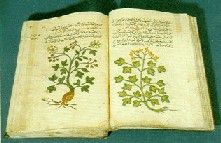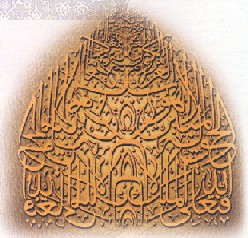|
Her
real name was Hind. She was the daughter of one of the
notables in the Makhzum clan nicknamed "Zad ar-Rakib"
because he was well known for his
 generosity
particularly to travellers. Umm Salamah's first husband
was Abdullah ibn Abdulasad and they both were among the
first persons to accept Islam. Only Abu Bakr and a few
others, who could be counted on the fingers of one hand,
became Muslims before them. generosity
particularly to travellers. Umm Salamah's first husband
was Abdullah ibn Abdulasad and they both were among the
first persons to accept Islam. Only Abu Bakr and a few
others, who could be counted on the fingers of one hand,
became Muslims before them.
Hind bint Abi Umayya, was married to the Prophet
(PBUH him) in the fourth Hijri year at the age of twenty
nine, following the death of her first husband, Abdullah
ibn Abdulasad, who has died from wounds he received in
the battle of Uhud. She and her husband were among the
first people to embrace Islam in its early days in
Mecca. They had suffered at the hands of Quraish who had
tried to force them to disown their new faith, but in
vain. They fled Mecca to seek refuge in Ethiopia, and
later returned to Mecca, thinking that the situation had
improved, but they found instead that it has became
worse. However, they received the Prophet's permission
to immigrate to Medina, but this was not as easy as they
imagined.
In the words of
Umm Salama: "When Abu Salama (my husband) decided to
leave for Medina, he prepared a camel for me, lifted me
up onto it and put my son Salama on my lap. My husband
then took the lead and went straight ahead without
stopping or waiting for anything. Before we were out of
Mecca, however, some men from my tribe, the Banu
Mahkhzum, stopped us and said to my husband: ‘Although
you may be free to do what you like with yourself, you
have no power over your wife. She is our daughter. Do
you expect us to allow you to take her away from us?’
Then they grabbed hold of him and snatched me away from
him. Some men from my husband's tribe, the Banu ‘No, by
Allah!’ they shouted. ‘ We shall not abandon the boy.
He is our son and we have a rightful claim over him.’
So they took him by his arm and pulled him away from me.
Suddenly, in the space of a few minutes, I found myself
all alone. My husband headed out towards Medina by
himself and his tribe had snatched away my son from me;
and my own tribe had overpowered me and forced me to
stay with them. From the day that my husband and my son
were parted from me, I went out at noon every day and
sat at the spot where this tragedy had occurred. I would
remember those terrifying moments and weep until
nightfall.

"I continued like
this for a year or so until one day a man from the Banu
Umayya passed by and was moved by my sadness. He went to
my tribe and said, ‘Why don't you free this woman? You
have caused that both, her husband and her son are taken
away from her.’ He went on like this, trying to soften
their hearts and appealing to their emotions, until at
last they said to me,’Go and join your husband if you
wish’. But how could I join my husband in Medina, and
leave my son, part of my own flesh and blood, in Mecca
among the Banu Abdul Asad? How could I remain free from
anguish, and my eyes free from tears, if I were to reach
the place of Hijrah not knowing anything of my little
son left behind in Mecca?
"Some people
realized what I was going through and their hearts went
out to me. They approached the Banu Abdul Asad on my
behalf and persuaded them to return my son. I had no
desire to remain in Mecca until I could find someone to
travel with me, for I was afraid that something might
happen that would delay me or stop me from reaching my
husband. So I immediately prepared my camel, placed my
son on my lap, and set out in the direction of Medina. I
just had just reached Tan'im (3 miles from Mecca) when I
met Uthman ibn Talha (he as in charge of looking after
the Ka'ba, but did not embrace Islam until the Conquest
of Mecca). ‘Where are you going, Bint Zad ar Rakib?' he
asked. 'I am going to my husband in Medina.' 'And isn't
there anyone going with you?' 'No, by Allah, except
Allah and my little boy here.' 'By Allah,' he vowed, 'I
will not leave you until you reach Medina.'
Thus after many
difficult months of separation, Umm Salama and her son
were reunited with Abu Salama, and in the next few years
that followed, they were always near the heart of the
growing Muslim community of Medina al Munawarra. They
were present when the Prophet (peace and blessings of
Allah be upon him) and Abu Bakr (may Allah be pleased
with him) arrived safely from Mecca, and at the battle
of Badr where Abu Salama fought bravely. At the battle
of Uhud, however, he was badly wounded. At first his
wounds appeared to respond well to treatment, but then
the have re-opened after an expedition against the Banu
Abdul Asad, and after that they refused to heal and he
remained bedridden.
Abu Salama
remained sick in bed for several days. One morning the
Prophet (peace and blessings of Allah be upon him) came
to see him. The visit was longer than usual, and while
the Prophet was still at his bedside, Abu Salama died.
Once again Umm
Salama was alone, only now she had not one child, but
several. There was no one to look after her and them.
All the Muslims in Medina were aware of Umm Salama's
situation, and when her idda period of four months and
ten days was over (Idda is the period that a widow
should remain in her house following the demise of her
husband. She cannot re-marry during that period), Abu
Bakr proposed marriage to her, but she refused. Then
Umar asked her to marry him, but again she refused. Then
the Prophet (PBUH) himself asked for her hand in
marriage. "O Messenger of Allah," Umm Salama replied, "I
have three main characteristics: I am a woman who is
extremely jealous and I am afraid that you will see
something in me that will make you angry and cause Allah
to punish me; I am a woman who is already advanced in
age; and I am a woman who has many children."
"As for your
jealousy," answered the Prophet, "I pray to Allah the
Almighty to take it away from you. As for your age, I am
older than you. As for your many children, they belong
to Allah and His Messenger." The answers eased her
heart, and the two were married in soon.
Umm Salama was
not the only wife to have been widowed as a result of
the battle of Uhud, and thanks to this marriage, many of
the Companions followed the Prophet's example, marrying
widows and thereby bringing them and their children into
the circle of their families, instead of leaving them to
struggle on their own.
A'isha said,
"When the Messenger of Allah (peace and blessings of
Allah be upon him) married Umm Salama, I felt very
unhappy when he mentioned her beauty to us. I waited
until I saw her and she was even more beautiful than his
description." She was also from a very noble family and
known for her keen intelligence. On more than one
occasion, the Prophet asked her advice in tricky
situations.
Like A'isha Bint
Abi Bakr and Hafsa Bint Umar, Umm Salama learned the
whole of the Qur'an by heart. Obviously, she was highly
trusted by her husband, as she was permitted to see the
angel Jibril in human form. It has been related by
Salman that Jibril came to the Messenger of Allah while
Umm Salama was with him, and had a conversation with
him. After Jibril had left, the Prophet said to Umm
Salama, "Do you know who that was?" and she replied that
it was a man called Dihya al Khalbi. "By Allah," said
Umm Salama, "I didn't think it was anyone else until the
Messenger of Allah told me who he really was."

She also had a home for her four children: Salama, Umar,
Zaynab, and Durra who were the foster children of the
Prophet. Once she was with the Prophet (peace and
blessings of Allah be upon him) with her daughter Zaynab
when Fatima came with al Hasan and al Husayn. He
embraced his two grandsons and said, "May the mercy and
blessings of Allah be upon you, Ahlal Bait (People of
the House = members of the family). He is Praiseworthy,
Glorious." Umm Salama began to weep and the Messenger of
Allah looked at her and asked tenderly, "Why are you
weeping?" She replied, "O Messenger of Allah, you
singled them out and left me and my daughter!" He said,
"You and your daughter are among the People of the
House." Her daughter Zaynab grew up in the care of the
Messenger of Allah and become one of the most
intelligent women of her time. Once Zaynab came in while
the Prophet was bathing and he splashed water in her
face. It is said that her face retained its youthfulness
even into her old age.
Her son Salama
later married Umama, the daughter of Hamza, the martyred
uncle of the Prophet. Umm Salama was married to the
Prophet for seven years until his death, and accompanied
him on many of his expeditions. |
